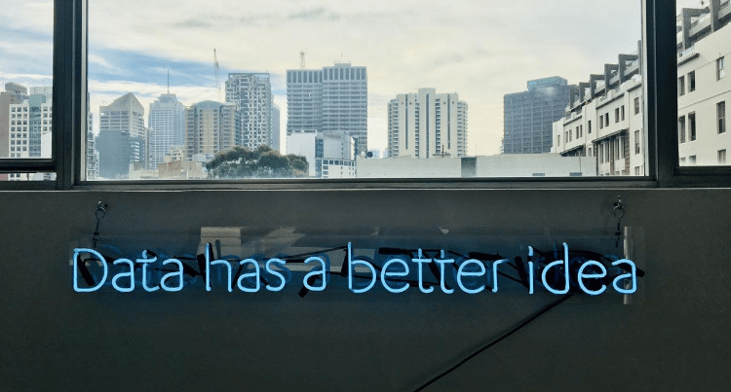The hospitality industry has always been laser-focused on improving customer experience. In this day and age, with the rise of hospitality-centric technology, one of the most impressive and efficient ways to do that is by collecting and analyzing customer data.
If that sounds like an intimidating idea, fear not! Guest blogger Beau Peters is talking through the ins and outs of how you can easily, safely, and usefully apply data to improving your venue's guest experience.

Anyone experienced in the hospitality industry can tell you that there are always a lot of crazy things pulling at your attention and forcing you to multitask. However, there are only a few major things that will make or break you. Of these, probably the most important is customer experience and satisfaction.
To put it simply, if the customer thinks you did your job well then you did. If they don’t, it really doesn’t matter how much extra effort you put in. Even a really bad start can end as a positive experience for the customer if you handle it correctly and are able to turn the tides in your favor.
In fact, reviews commending your effort in a difficult situation may be some of the most positive ones you ever receive.
Data analysis can be a powerful means of understanding and predicting customer behavior and reactions which can give you a huge boost in anticipating their needs and providing the highest quality customer service.
Remember: there are many countries around the world where customer data is protected by strict laws (such as the EU's GDPR guidelines). Not sure you're up to speed with how to legally store and analyze customer data? Typsy's got you covered.
Making it techy
The idea of using data in a realm that is largely based on face-to-face interactions can seem a little backward. However, data is currently being used in ways that many of us don’t even imagine. In marketing — especially digital marketing — data is becoming a key factor in predicting customer interests and targeting marketing campaigns to draw in potential customers.
Taking steps to make your customer experience more data-driven starts with collecting data about customers in every way you can. This can be through online pre-trip planning decisions, room preferences, satisfaction surveys, and much more.
Use this information to make changes where necessary, whether that is marketing on different online platforms or altering policies to make them more customer-friendly.
You should considering investing in technologies that make the user experience easier and more streamlined. For instance, offer online check-in options or digital room service. Understanding the uses of technology can even save the company money by limiting the number of customer service reps that need to be available or by reducing energy bills with the installation of smart appliances and technologies.
Training with Typsy is simple, scalable and effective. Access reports and analytics on the training you assign to your hospitality team.
.png?width=600&name=Typsy%20%20We%20teach%20hospitality%20to%20the%20world%20%20typsy.com%20blog%20banner%20_%20(1).png)
Access Typsy's 1000+ lessons as and when it suits you. Learn your way - starting today.
Wading through data
Set some metrics
Perhaps one of the most overwhelming tasks associated with beginning to collect customer data is just the sheer amount of it you will have to wade through for analysis. Determining what is and is not important information can be a challenge, but it is easier to do if you limit yourself to measuring a few specific metrics at a time.
Once you have a handle on that, it may be time to expand the metrics you’re using and look into incorporating more information in different ways.
Think critically about what the data's actually saying
Humans are full of errors, assumptions, and biases that we often don’t even think about as problematic. However, these prejudices can skew the data a certain way and prevent companies from actually making the changes the data is telling them to make.
When looking at and trying to understand the metrics you are collecting, try to go in with an open mind and don’t make any assumptions about what is going on until the data clearly shows a trend to back you up.
Predictive analysis is a powerful tool in the marketing realm. Companies such as Amazon estimate that predictive recommendations based on previous purchases comprise nearly one-third of their overall business!
That being said, incorporating machine learning into anticipating the needs of customers both as they are booking and once they arrive can have a profound impact on your customer service ratings.
Improving customer experience
Ultimately, all of the data you collect isn’t going to mean much if you aren’t able to turn it into a positive change for your company. Data can tell you a great deal about how to cater better to customers and improve customer service.
In the end, customer satisfaction is king; some studies estimate that not only will customers spend more money if they are happy with their experience, but that most companies are missing out on these extra funds because of dissatisfaction.
Arguably the most powerful means of turning data into profits is through personalization. Any marketing professional will tell you that personalization to the specific needs of specific customers is all the rage in the marketing industry right now.
Jumping on this bandwagon is a good idea. In the hospitality industry, this can mean catering to regular customers and offering them specialized promotions or even training staff to interact more with customers to offer personalized treatment.
High-quality customer experience is the ultimate marketing strategy — even though the times are changing and more technology is involved, it is a tried and true means of instilling loyalty and brand recognition. Satisfied customers are more likely to recommend your product to others. Building a reputation for quality care and helpfulness will do more for you than nearly any other strategy out there.
Bringing data-driven decision making into your approach to improving customer experience can be a monumental boost to your company. Using predictive analysis to measure a few specific metrics and data personalization to boost interest are good places to start.
 |
Beau Peters is a writer with an increasingly diverse portfolio and a history in business management. He has a passion for sharing what he has learned with others and enjoys making the world a better place. When he is not tucked behind a cup of coffee and a laptop, Beau likes to meet new people and try new things. |
You might also like